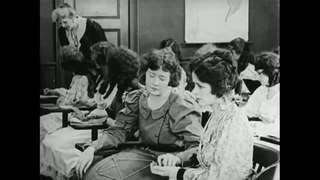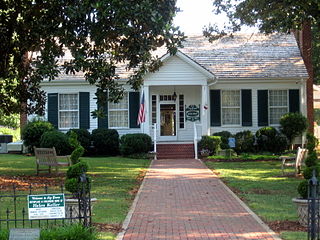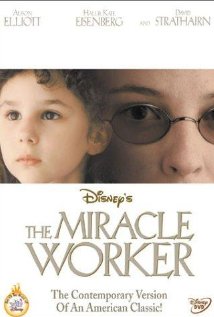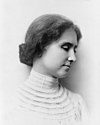
Helen Adams Keller was an American author, disability rights advocate, political activist and lecturer. Born in West Tuscumbia, Alabama, she lost her sight and her hearing after a bout of illness when she was 19 months old. She then communicated primarily using home signs until the age of seven, when she met her first teacher and life-long companion Anne Sullivan. Sullivan taught Keller language, including reading and writing. After an education at both specialist and mainstream schools, Keller attended Radcliffe College of Harvard University and became the first deafblind person in the United States to earn a Bachelor of Arts degree.

Anne Bancroft was an American actress and director. Respected for her acting prowess and versatility, Bancroft received an Academy Award, three BAFTA Awards, two Golden Globe Awards, two Tony Awards, two Primetime Emmy Awards, and a Cannes Film Festival Award. She is one of 24 thespians to achieve the Triple Crown of Acting.

The Miracle Worker refers to a broadcast, a play and various other adaptations of Helen Keller's 1903 autobiography The Story of My Life. The first of these works was a 1957 Playhouse 90 broadcast written by William Gibson and starring Teresa Wright as Anne Sullivan and Patricia McCormack as Keller. Gibson adapted his teleplay for a 1959 Broadway production with Patty Duke as Keller and Anne Bancroft as Sullivan. The 1962 film also starred Bancroft and Duke. Subsequent television films were released in 1979 and in 2000.

Deliverance is a 1919 silent film which tells the story of the life of Helen Keller and her teacher, Annie Sullivan. It stars Etna Ross, Tula Belle, Edith Lyle, Betty Schade, Sarah Lind, Ann Mason and Jenny Lind. The film also features appearances by Helen Keller, Anne Sullivan, Kate Adams Keller and Phillips Brooks Keller as themselves. The movie was directed by George Foster Platt and written by Francis Trevelyan Miller.

Anne Sullivan Macy was an American teacher best known for being the instructor and lifelong companion of Helen Keller.

Alison Pill is a Canadian actress. A former child actress, Pill began her career at age 12, appearing in numerous projects before transitioning to adult roles with a breakthrough role in the television series The Book of Daniel (2006). That same year, she made her Broadway debut in The Lieutenant of Inishmore (2006) earning a Tony Award for Best Featured Actress in a Play nomination. Her other notable stage roles include in Blackbird (2007), Mauritius (2007), The Miracle Worker (2010), The House of Blue Leaves (2011), and Three Tall Women (2018).

William Gibson was an American playwright and novelist. He won the Tony Award for Best Play for The Miracle Worker in 1959, which he later adapted for a film version in 1962.
Deafblindness is the condition of little or no useful hearing and little or no useful sight. Different degrees of vision loss and auditory loss occur within each individual. Because of this inherent diversity, each deafblind individual's needs regarding lifestyle, communication, education, and work need to be addressed based on their degree of dual-modality deprivation, to improve their ability to live independently. In 1994, an estimated 35,000–40,000 United States residents were medically deafblind. Laura Bridgman was the first American deafblind person known to become well educated. Helen Keller was a well-known example of an educated deafblind individual. To further her lifelong mission to help the deafblind community to expand its horizons and gain opportunities, the Helen Keller National Center for Deaf-Blind Youths and Adults, with a residential training program in Sands Point, New York, was established in 1967 by an act of Congress.
Hallie Kate Eisenberg is an American former child actress, best known for being "The Pepsi Girl" in a series of Pepsi commercials, as Marie Alweather in Paulie, and her role as Erika "Erk" Tansy in How to Eat Fried Worms.

The Parent Trap is a 1998 American romantic comedy film directed by Nancy Meyers in her directorial debut, who also wrote with David Swift and Charles Shyer, who also produced. It is a remake of the 1961 film of the same name and an adaptation of Erich Kästner's 1949 German novel Lisa and Lottie.
Helen Keller: The Miracle Continues is a 1984 American made-for-television biographical film and a semi-sequel to the 1979 television version of The Miracle Worker. It is a drama based on the life of the deafblind and mute Helen Keller and premiered in syndication on April 23, 1984, as part of Operation Prime Time syndicated programming.

The Miracle Worker is a 1962 American biographical film about Anne Sullivan, blind tutor to Helen Keller, directed by Arthur Penn. The screenplay by William Gibson is based on his 1959 play of the same title, which originated as a 1957 broadcast of the television anthology series Playhouse 90. Gibson's secondary source material was The Story of My Life, the 1903 autobiography of Helen Keller.

Ivy Green is a historic house museum at 300 West North Commons in Tuscumbia, Alabama, United States. Built in 1820, it was the birthplace and childhood home of Helen Keller (1880–1968), who became well known after overcoming deaf-blind conditions to communicate; she became an author and public speaker. Designated as a National Historic Landmark, it is now operated as a museum honoring and interpreting Keller's life.

Abigail Breslin is an American actress. Following a string of film parts as a young child, she rose to prominence at age 10 when she played Olive Hoover in Little Miss Sunshine (2006), for which she received a nomination for the Academy Award for Best Supporting Actress. Breslin went on to establish herself as a mainstream actress with roles in films such as No Reservations (2007), Nim's Island, Definitely, Maybe, My Sister's Keeper, Zombieland, Rango (2011), The Call, August: Osage County, Maggie (2015), and Stillwater (2021). Her other projects include the Fox series Scream Queens (2015–2016), where she portrayed Libby Putney, her first regular role on television.

The Miracle Worker is a three-act play by William Gibson adapted from his 1957 Playhouse 90 teleplay of the same name. It was based on Helen Keller's 1903 autobiography The Story of My Life.
Sophia Kindrick Alcorn was an educator who invented the Tadoma method of communication with people who are deaf and blind. She advocated for the rights of people with disabilities and upon retiring from her long career in teaching, she worked with the American Foundation for the Blind.
A miracle worker is a magician or saint who performs magic or miracles.
The 22nd Young Artist Awards ceremony, presented by the Young Artist Association, honored excellence of young performers under the age of 21 in the fields of film and television for the year 2000, and took place on April 1, 2001, at the Sportsmen's Lodge in Studio City, California.
The Miracle Worker is a 1979 American made-for-television biographical film based on the 1959 play of the same title by William Gibson, which originated as a 1957 broadcast of the television anthology series Playhouse 90. Gibson's original source material was The Story of My Life, the 1903 autobiography of Helen Keller. The play was adapted for the screen before, in 1962.

Helen Keller Day is a commemorative holiday to celebrate the birth of Helen Keller, observed on June 27 annually. The holiday observance was created by presidential proclamation in 2006 as well as by international organizations, particularly those helping the blind and the deaf. The holiday is known for its fashion show, held on June 27 annually for fundraising purposes.











